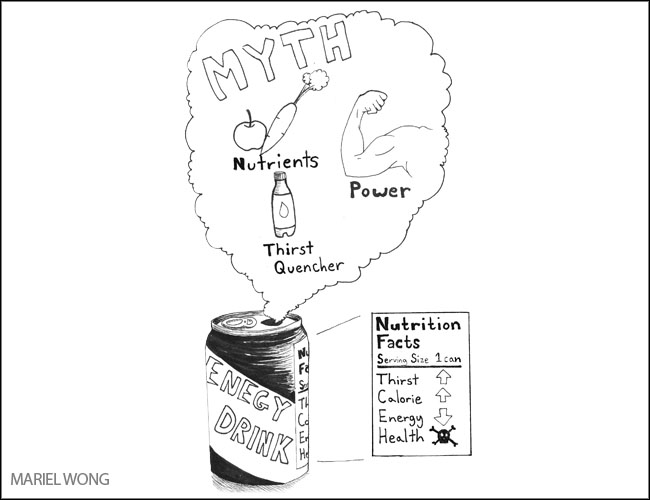
GATORADE
The game has been changed. People are running faster, gaining back proteins, and becoming as cool and athletic as the endorsed athletes. Its source is one simple liquid: Gatorade.
Although Gatorade has gained much popularity among Aragon students for its taste and visual appeal, many are wary of its health implications.
Freshman Aria Farahani says, “I drink [Gatorade] because it tastes good but it’s not that healthy for you since it contains a lot of sugar and food coloring. It does give you the stuff you need, like energy during sports. When I’m playing soccer, it gives me a little more energy to run.”
Freshman Jennifer Saldana, however, argues for the health benefits of this drink. She says, “Gatorade has a lot of things that are actually good for you. If you only drink water you lose these electrolytes that you need to survive and Gatorade helps regain them.”
Senior Hillary Koh stays away from Gatorade for multiple reasons. “My parents don’t buy them and I don’t really think they’re that healthy. They seem kind of unnatural and it’s always better to drink water,” she says.
Ninth grader Peter Boukhalil agrees, “I’m pretty sure that all parents disapprove of their children drinking energy drinks because they’re not that good for you since they might get you too energetic and jittery.”
PE teacher Linda Brown emphasizes the unhealthy nutritional effects of Gatorade. “A bottle is not just one serving, it’s two or three servings,” she states. “If you drink one bottle, that could be three or four hundred calories. Normally, in a day, you’re supposed to have three thousand calories so that’s a fifth of your daily nutrition.”
ENERGY DRINKS
Energy drinks such as Monster and Redbull are also popular among the Aragon student population, although most consumers realize the health dangers of the product.
Senior Stephanie Willoughby says, “[Energy drinks] can affect your sleep pattern and be bad for your health sleep wise. They could make it harder to think the next day or you could be run down the next day because of them.” Sophomore Valentina Portela says, “At first [energy drinks] make you really hyper but then after they just crush you. You just get really tired afterwards.”
Freshman John Danhel Fajardo comments on the seeming duplicity of the energy drink labels. “[Energy drinks] have ingredients that are bad for the system hidden, [or not visually acceptable], on the back of the label,” he says.
Despite the numerous health problems and risks associated with energy drinks, they still are popular among our students.
Junior Lauren Pon theorizes a psychological cause. She says, “It’s just the fact that some people think that [the drinks] give you energy.”
Others look to advertising as the main endorsers of energy drinks. Brown says, “Advertising is a big part of it. People see all these famous athletes that are drinking [energy drinks]. They think that if it helps the athlete’s performance it might help their performance.” junior Frank Romano says, “Advertisements make teens think it’s cool to drink their product, plus all the logos they have on them.”
At the end of the day, the choice of drinking energy drinks is always there. They can be our friends in many ways, but they can also be our enemies. Drink wisely, Aragon.




